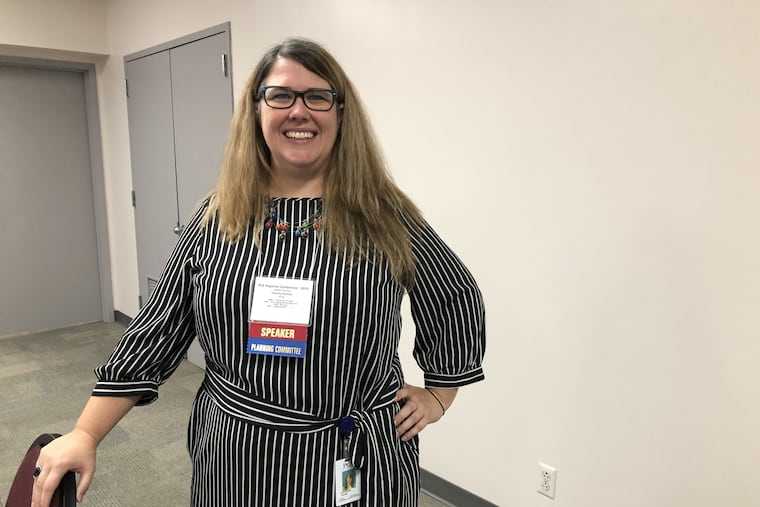Is it really a compliment to say you look young for your age?
At a meeting at Philadelphia Corporation for Aging, people who work with seniors got tips on ageism.

People often tell Katie Young, a planning manager for the Philadelphia Corp. for Aging (PCA), that she looks young for her age. She is a mere 41.
As someone who is on the alert for ageism, she bristles. "That is my age," she says. "Therefore, I look exactly my age."
Young, who has a master’s degree in gerontology, led a workshop on ageism last week at the annual PCA Regional Conference on Aging, a three-day event aimed at professionals who work with older adults. More than 400 registered to attend.
Throughout our lives, she said, we’re aging. For most of our years, the physical changes we experience are accepted as a normal part of life. “That was just the next phase,” she said. At some point, though, society decides aging is bad. “You look younger” is meant as a compliment.
Young’s focus was on how people who work with the aged have been affected by negative messages about aging.
It starts, she said, as soon as someone decides they’d like to work with older adults. Friends rarely react with enthusiasm. “What does that tell you about what society thinks about who we’re serving?” Young asked. “They don’t count.”
Many in Young’s audience were in their 60s themselves, but said they felt much younger. Patty Davis, 64, a social worker for SOWN, a Philadelphia agency that works to reduce social isolation among older women, said she was taken aback by a comment her niece made. “She says to me, ‘When you don’t dye your hair, you look like you’re not taking care of herself.’”
Davis, whose undyed hair is a mix of brown and gray, was upset enough about that comment to ask coworkers and her hairdresser about it. “There was something about that that got me,” she said.
Young listed some comments that many consider ageist: “She is still sharp as a tack.” “He is spry for his age.” “Old age isn’t for sissies.”
They stem from assumptions that old people are almost always addled and sick. Young said the messaging needs to change. Dementia, while common among the oldest, is not inevitable. Many older people are healthy. Even older people with some chronic health problems can thrive emotionally. Many over age 65 find they are happier than they were when they were younger. Older people don’t get credit for how much they enrich their communities.
"There are lots of successful aging stories out there," Young said. "They just don't get enough air time."
» READ MORE: As they age, women lose their hair too. Which treatments really work?
Jean Rivers, a PCA assessment worker, said some potential clients seem eager to embrace the idea that they are old and need more help than they actually do. She tries to tell them it’s a good thing that they’re doing so well. She said her mother-in-law seemed to feel older as soon as she qualified for senior-citizen discounts. “I can get the senior-citizen discount,” she thought, “I must be a senior citizen.”
Young said that people who work with older adults tend to see disproportionate numbers of people who are frail, dependent, and sick. She wondered how that affects their own attitudes toward aging.
Julia Diggs, a program manager with West Philadelphia Senior Community Center, said many seniors resist coming to her programs. “I don’t want to come in and sit around with these old people,” they’ll say. Then they find out they can learn about computers or sewing. They can exercise and eat meals with others. “They’re having a lot of fun,” Diggs said. Sometimes the staff is jealous of their freedom. “We’re learning that this age thing is not bad, and we have something to look forward to when we’re older.”
But others in what had been a talkative crowd had little to say about whether their constant exposure to the hard side of aging had made them more susceptible to ageist ideas. Young thinks that’s a sign that this is a topic ripe for research. Her gut reaction was that staffers didn’t want to admit they could have been affected by their work. “They’re not cognitively aware of the messaging they’re taking in,” she said. “Maybe they’re internalizing it more than they know.”